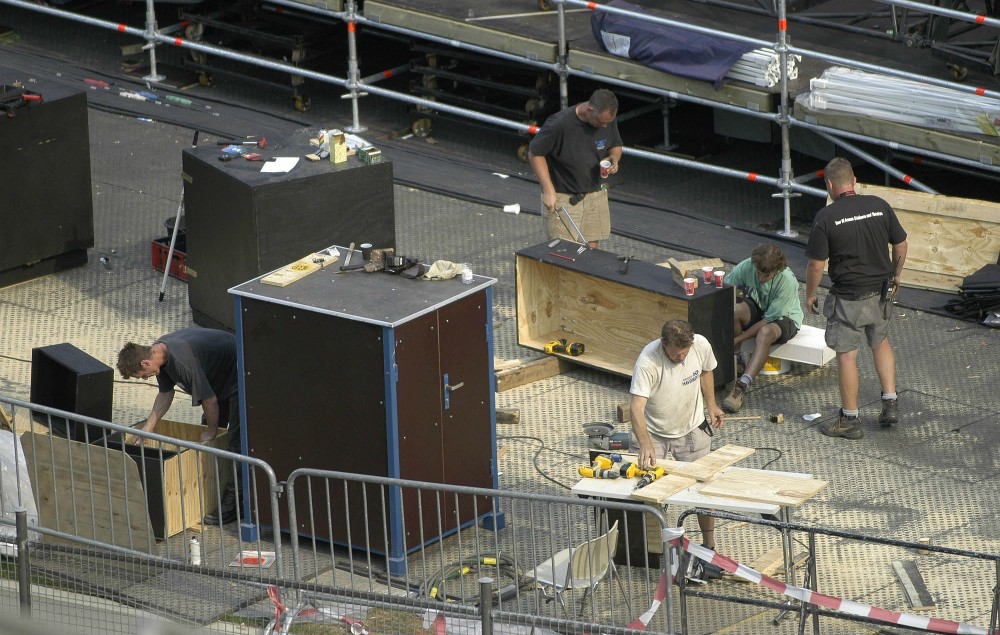UK government criticised for not negotiating with EU countries on touring despite music industry being “in crisis”
The UK government has admitted that they are currently not negotiating with EU member states over touring arrangements for artists and crew, despite hearing that the music industry was “in crisis” and in urgent need of action.
After many within the UK music industry were left reeling in anger at Culture Minister Caroline Dinenage’s response to a debate in Parliament last week where she again rejected the idea of a visa-free “musicians passport” for artists and crew and repeated claims that the EU was at fault, today saw the Minister quizzed by MPs on the government’s handling of the situation and potential routes towards a solution.
Before Dinenage faced questioning, the Digital, Culture, Media and Sport Committee heard the testimony of voices from across the worlds of music, film, TV and theatre who declared that the £111billion UK creative industries were currently “in crisis” as a result of the failed Brexit negotiations which have effectively “left them with a No Deal” scenario.
The hearing was told that many had now been faced with a choice of “being British or a musician” as well as that repeating fears that a great deal of jobs and income for crew, haulage and production will be lost to the EU with operations based in Britain now unviable and the traditional means of touring the continent now impossible.
Chief Executive of the Incorporated Society of Musicians Deborah Annetts criticised the government for a lack of clarity and communications regarding the negotiations and the fallout, but said that she and others had followed up on the 280,000-strong petition calling for visa-free touring by coming up with their own visa agreement draft that had been seen by lawyers and submitted to the DCMS. “We think there is a workable agreement there,” she said. “The work has been done, it’s just a question of government commitment.”
When the government’s stance that their “door remains open” should the EU change its mind over negotiating on touring was raised, they were criticised for not being proactive enough with it claimed that they should actually be “banging the EU’s door down” to find a solution.

Contributor: Christian Bertrand / Alamy Stock Photo
However when facing questioning, Dinenage again dismissed the idea of visa-free touring and said that there was “no appetite” to resume negotiations with the EU and that demands had been made of the UK that had not been asked of other G7 countries.
“We fought for a really good deal for our world-leading creative industries, and I deeply regret that the EU rejected our proposals,” she said. “The proposals that they put on the table wouldn’t have addressed the sector’s concerns.”
After claiming that “a visa waiver does not cover the issue of work permits” and would therefore not tend to the needs of touring artists and crew, Dinenage said that an “EU-wide agreement is going to be very complicated” and that it would be “more successful to make arrangements with individual member states” and push for better clarity and assistance for acts wishing to enter those countries.
However, it was then revealed that there are currently “no negotiations taking place with individual member states on visas” and that there was “no definitive approach in place” on what the negotiations would even involve.
Dineage and MP Alistair Jones from the DCMS said that it was “early days” for the UK’s position in Europe post-Brexit (despite knowing that Brexit was looming since 2016) and said that they’d be “using diplomatic tools at our disposal to improve this situation” with “conversations about how to take this forward happening very shortly”.

With cabotage laws meaning that now trucks can only make one stop in an EU state before having having seven days make two more stops and return immediately to the UK, the hearing heard how this created a “complete lack of ability to be able to tour at all” for crew workers and production staff – meaning that thousands of jobs and taxable income will be lost with companies moving to Europe as a result.
Dineage said that the government were “painfully aware of some of the challenges, particularly for the haulage industry” but made assurances of their “absolute determination to work with other government departments to sort this out.”
Asked about the potential of a more over-arching approach to tend to all the visa, working, cultural and transport needs Dinenage said that she regretted that the “government doesn’t always work the way we wished it to”.
Chair of the committee Julian Knight MP warned that the Brexit stand-off for the UK’s cultural industries means that “We’ve lost out on the thing that we have a competitive advantage in”, before Dineage and Jones were questioned as to why no assessment had been done into how much of the UK’s £111billion stands to be lost to the EU as a result of Brexit.
“The difficulty is getting to the fine detail of parts of some of the negotiations,” Dinenage replied. “The working group needs to make more progress to figure out the things that we can solve, but in the meantime we are having negotiations with the treasury as to what support is required.”
The House Of Commons’ chair of petitions and Labour MP Catherine McKinnell then ended by saying: “I would say that on behalf of artists, there will be concern that the government doesn’t have more vision of the impact of the failure to arrive on an agreement.
“On behalf of the petitioners, I would urge the government to reconsider its position and to look at an EU-wide solution that would avoid many of these difficulties that many artists are now going to be facing.”

Anger remains among the industry about the lack of clarity and action around a solution. Featured Artists’ Coalition CEO David Martin told NME that “the problems faced by leaving the EU risk being existential for the music industry”.
“As we continue to probe issues around work permits, visas, carnets, haulage and VAT, we discover more problems than solutions,” he said. “The Committee will need more time to investigate if they hope to fully understand the implications that this version of Brexit will have on British music. The barriers which we currently face risk wiping out the viability of our industry for a generation, making a career in music accessible only to those from privileged backgrounds.
Martin continued: “In the short term, we require absolute clarity around the current regulatory regime plus dedicated guidance from Government, alongside financial and logistical support to mitigate the immediate barriers. In parallel, Government must endeavour to find robust longer-term solutions with European politicians.
“This is essential if British music is to retain its truly world beating status and if we are to sustain the pipeline of new British talent, which right now is faced with a very bleak outlook.”
The current problems that surround post-Brexit touring stand to be far reaching. Beyond the fears that the new added huge costs to future live music tours of the continent will prevent rising and developing artists from being able to afford to do so, European festival promoters have said that they could be likely to book fewer UK acts as a result, and a great deal of jobs and income for crew, haulage and production will be lost.
It has also been warned that it could prevent not-yet-established UK acts from being able to acquire a visa to tour in the US, if they are unable to establish the required “international reputation” that can come from playing in Europe.
